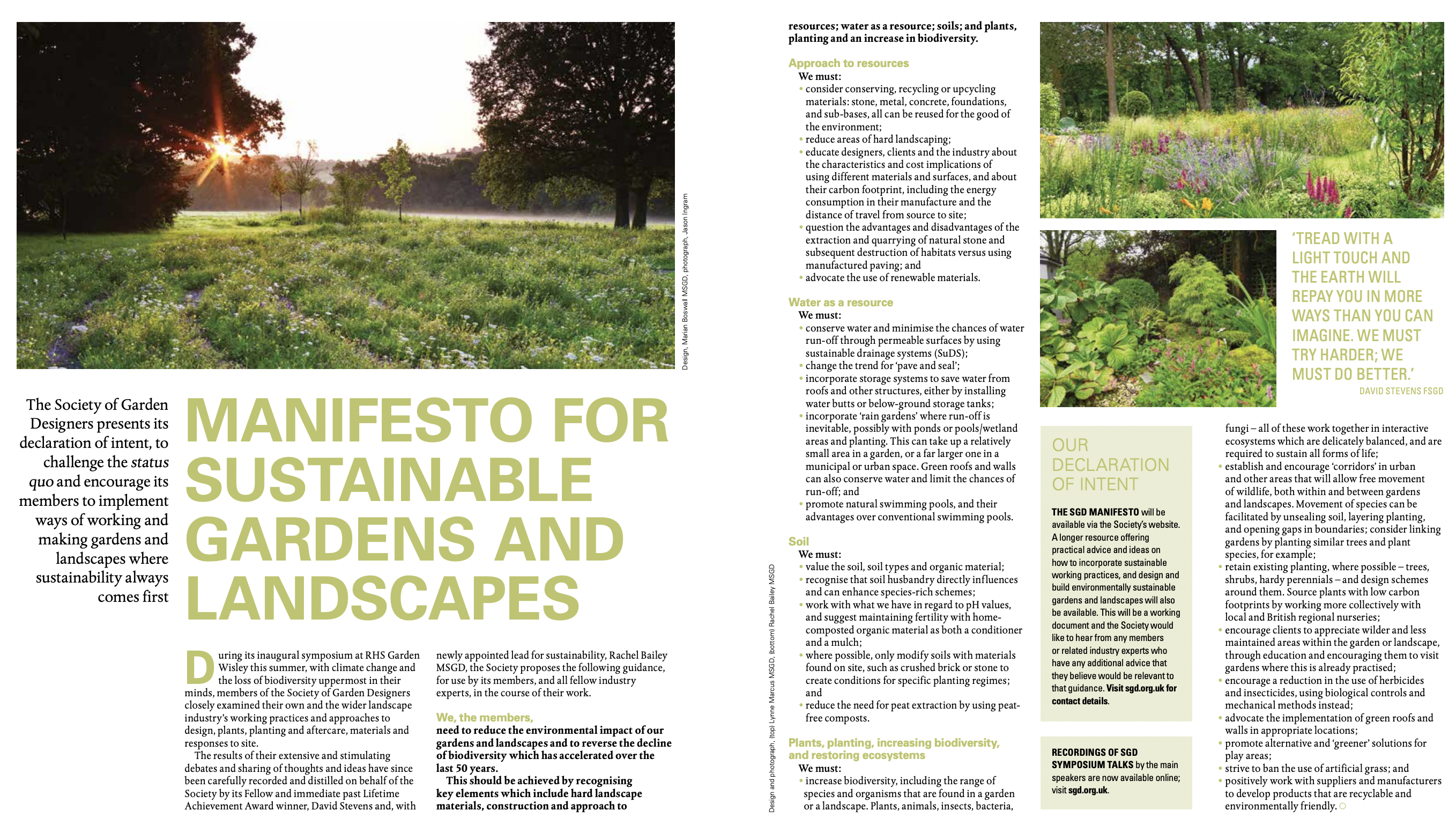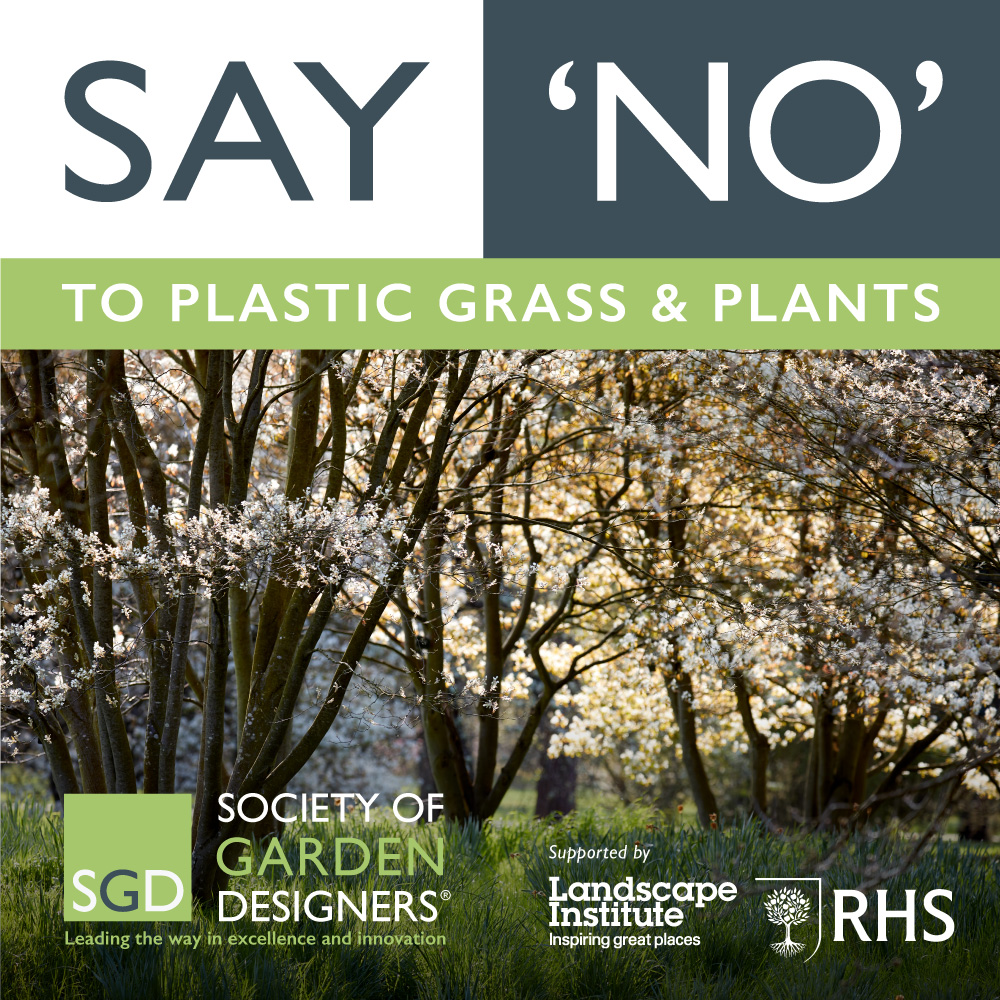Sustainability & Environment
The SGD Manifesto for Sustainable Landscape and Garden Design
Following on from the hugely successful SGD Symposium this year, the Society of Garden Designers has published a Manifesto for Sustainable Gardens & Landscapes. The Manifesto is a declaration of intent and is designed to establish principles and methodologies that encourage SGD Members and Affiliated Business Partners to create gardens and landscapes where sustainability comes first. Please click here to download the SGD Manifesto
For SGD Members and Partners, we have released a Manifesto Support Guide which contains practical advice and ideas on how to work more sustainably with contributions collated from the SGD members and experts who attended the Symposium. Please click here to download the Manifesto Support Guide which is available on the Members section of the website under the General tab.
From October 2022, the Society is running a number of CPD (Continued Professional Development) sessions to share knowledge and advice on designing sustainably. Find out more and book a place on a CPD session here
The SGD Manifesto, the Manifesto Support Guide and the new CPD sessions are part of a longer-term SGD strategy, set out in its Environmental Action Plan, that has been adopted to address both the environmental crises of climate change and biodiversity loss. Please find out more about this below.

The Environmental Action Plan
The Society of Garden Designer's commitment to addressing the climate emergency, biodiversity crisis and over-consumption of natural resources
The Environmental Action Plan can be downloaded here
As designers, we need to be fully aware of the deepening climate emergency, biodiversity crisis and depletion of natural resources that is occurring and our part in it, no matter how small that may seem. We have the possibility of creating either negative or positive consequences in the world as a result of our design and material choices. Given the large accumulative area of residential and public gardens in the UK, this large amount of land has the potential to offer the potential to sequester carbon, provide ecosystem services and offer diverse habitats to help reverse the loss in biodiversity. Gardens need to be and can be the solution, not the problem.
In the larger scheme of things, we must understand that we may be beautifying one space (a garden) at the expense of another (the material source). Ultimately, just lessening this impact is not enough and we must strive to create positive outcomes all around (cradle-to cradle, carbon negative etc). However, we also have to begin somewhere and we do that through understanding the impacts that different materials have on the Earth’s ecosystems.
We start with the simple idea (which may nonetheless be challenging of itself, given current trends) to put less structure into a garden, and more planting. Then we choose materials that fulfil our needs with the minimum possible impact.
The Guidance Notes listed below are the first few written in what will eventually become a (hopefully) comprehensive resource on material selection. In it, we try to be objective, listing the pros and cons of each thing. There are few absolutes, there is no easy way in which to add up carbon emissions for any one thing. Instead, we try to make assessments of the likely facts: geographical source, working conditions, environmental impact, transportation, energy inputs, scarcity etc, etc, and to weigh those against the benefits.
Say No to Plastic Grass & Plants
This urgent campaign is designed to raise awareness of the extreme environmental damage caused by these products and to encourage the landscape industry and the public to seek environmentally friendly alternatives.
We are delighted that both the RHS and the Landscape Institute are endorsing this important campaign and we need your support too. We are calling on all our members, affiliates and friends to support us in three simple ways:
- Post our ready-made social media tile on your social media platforms
- Read and share the campaign leaflet with your clients and associates
- Add the campaign banner to your website and email signature
Please help us to debunk the claims that plastic grass & plants are harmless and join us in sharing ideas and advice on using beautiful, natural solutions instead.
THE SOCIAL MEDIA TILE
Use this ready-made social media tile to show your support for the campaign and announce your commitment to using environmentally friendly products only.
Simply download the image below (please click the image to view it at full size) and post on your own social media platforms. Please credit the image to Alister Thorpe.

THE CAMPAIGN LEAFLET
The campaign leaflet outlines the facts about plastic grass and plants and dispels the myths that these products are eco-friendly. It offers information and advice on using sustainable alternatives such as low-mow and drought-tolerant lawns as well as offering suggestions for the best type of lawn to use for play and as sports turf. We hope you will be able to share the leaflet with your clients and associates to help to stop the proliferation of plastic grass.
Download the campaign leaflet (PDF) here
THE CAMPAIGN BANNER
Please add the campaign banner to your website and email signature to show your commitment to the campaign. Simply download the image below (please click the image to view it at full size) to get started.

For further information on natural lawns and lawncare watch our webinars produced in partnership with the London College of Garden Design here:
https://vimeo.com/showcase/10126386
Enter the password: LawnIBs
Policy Statements & Positioning Papers
The following are policies or statements setting out the SGD’s position on various issues relevant to the topics on this page:
SGD Policy on Advertising & Sponsorship
Biodiversity Net Gain
BNG Guidelines
Guidance Notes
So far, the following Notes are available:
GN 001 Artificial Turf, Plants and Walls
GN 002 Pots & Plastic
GN 003 Lawns
GN 018 Reclaimed Timber
GN 022 Tropical Timber
GN 024 Patio Heaters & Fire Pits
There are 30+ titles in preparation which will be added on a regular basis.
Advisory Notes
AN 001 Plant Passports | Application for Official Registration
Guidance Notes from Other Organisations
TGN 01-19 Biosecurity Toolkit rev 2.pdf